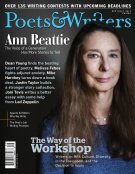A clear editorial mission or theme—whether it’s based on a specific concept, population of writers, or aesthetic—can make a journal stand out and catch a reader’s attention. And for writers deciding where to submit work, journals with well-defined identities may offer some clarity among what can feel like an overwhelming number of publications. In that spirit, each issue of twenty-two-year-old Benjamin Moe’s new annual, Table Talk (tabletalk.io), offers a conversation on a single idea in order to create “a new kind of literary magazine that explores hard-to-define experiences from unexpected angles.” The first issue of the New York City–based magazine was focused on duende, while the second issue, which features an essay from Yusef Komunyakaa and fiction from Priya Jaikumar, explores dyno, a term for the leap that rock climbers must make to cross difficult terrain. For Issue Three, Moe says the editors are considering graphic designer John Koenig’s term sonder, which refers to “the realization that everyone, the person next to us at work, across from us on the subway, has just as complex a life as we do.” Poetry, fiction, and nonfiction submissions will open via Submittable in early 2016.
Since its 2004 launch, the self-proclaimed “singular, idiosyncratic, and a little mysterious” biannual Black Clock (blackclock.org), run out of the California Institute of the Arts in Valencia, has been turning heads with its eccentric design and content. Issue 19 focused on “family madness,” while Issue 18 offered the writer’s equivalent of the “director’s cut,” with samples of cut or rejected writing. The new, neon-splattered Issue 20 celebrates the fiftieth anniversary of the psychedelic era, and includes contributions from founding editor Steve Erickson on the impact of psychedelia and Ann Powers on free love. Submissions in fiction and nonfiction are closed for the fall; check back in the winter for submission details.
Published by CentroVictoria, the Center for Mexican American Literature and Culture at the University of Houston in Victoria, the annual journal Huizache (huizachemag.org) has carved out its editorial niche as a magazine that promotes Latino literature. Founding editor Dagoberto Gilb established Huizache in 2010 because, he says, “Literary magazines might have twenty-five slots and they give one slot to a black writer and one slot to a brown writer and the twenty-three others are the usual suspects and then they say, ‘See, we care.’ Well, I’m tired of always trying to make ourselves available.” Huizache’s first four issues included work from notable writers such as Terrance Hayes and Juan Felipe Herrera, and the fifth issue features new work from Denise Chávez, Vanessa Diaz, and many others. The journal makes a home for work that “challenges ethnic, gender, or social stereotypes,” not necessarily limited to writing with a Latino focus. Poetry, fiction, and essay submissions are accepted via the Huizache website from September through April.
With forty issues under its belt, the prodigious biannual the Bitter Oleander (bitteroleander.com), published by Bitter Oleander Press in Fayetteville, New York, adopts a more global editorial perspective. Defined by its commitment to printing contemporary international poetry and short fiction, the journal routinely includes translations of international poets. “I cannot think of a time in cultural history when translations have reached such great proportions,” said founding editor Paul B. Roth in a 2014 interview with Ragazine. Issue 21.2 features an interview with New York City poet and fiction writer Stephanie Dickinson, as well as a selection of her work. The Bitter Oleander accepts submissions in fiction and poetry year-round through Submittable.
Finally, the brand-new Brooklyn, New York–based biannual American Chordata (americanchordata.org), a publication founded by W. W. Norton associate editor Ben Yarling earlier this year, is on its way to solidifying an editorial identity with an impressive debut issue, which was published in June. An earnest, attractive intelligence pervades the offering, from the directness of the journal’s mission (“Deliberate respect for the plurality of human experience”) to the colorful art and bold pull quotes. Highly recommended contributions include Diana Xin’s opening story, “We Lived Like Astronauts,” and Tammy Mercure’s photography of New Orleans. Yarling describes the issue as “People making work that’s surprising but not flashy. Unusual but not esoteric. Cool without being cold.” American Chordata accepts poetry, fiction, and nonfiction submissions year-round via e-mail at submissions@americanchordata.org.
Travis Kurowski is the editor of Paper Dreams: Writers and Editors on the American Literary Magazine, published in 2013 by Atticus Books. His website is traviskurowski.com.








